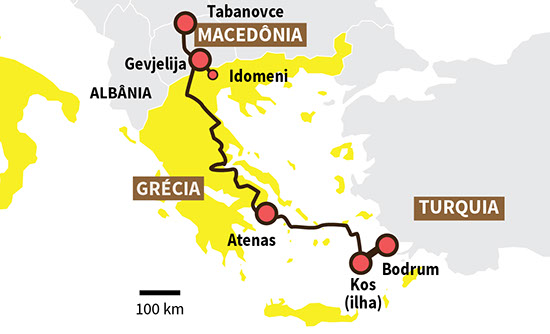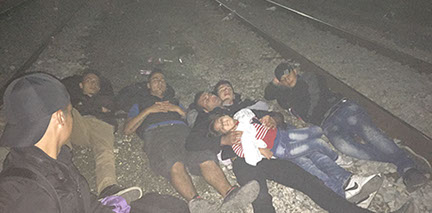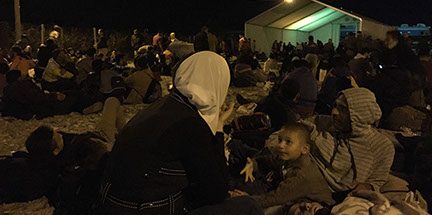Hope
on rails
On a train trip to Serbia through the Macedonian countryside, the night wind finds its way through the open doors of the train. There are not enough seats for everyone.

OThe path which separates Idomeni in northern Greece and Gevgelija in Macedonia has been called a "no man's land" by international agencies. Ghazi and Razan walk through it, holding the slumbering children in their arms on this late Tuesday evening. They pass by a Greek police car, which merely watches the constant flow of buses bringing new loads of refugees. Thousands of people are already marching ahead of them. In September 2015, figures released by Macedonian authorities indicated that up to 5,000 people were coming to the border each day.
“It's a lot of people! A lot!” the men in the group exclaim with amazement.
We walk for 20 minutes until we come across rows of migrants sitting on the tracks. The information passed by word of mouth is that the border police will gradually let small groups of people into the country. Ghazi asks everyone to sit together to keep the group from splitting up. Mohammad wakes up on his father's lap and starts playing with the stones on the ground, his only available toy in this rough journey.
Musa and Ammar move away from the group to pray. They join their hands, then kneel and bend their body on the tracks, around the gravel. They thank Allah for helping them get this far and ask for protection in their following steps. When Musa comes back, he makes a positive gesture.
“Let's move on, it’s going to be alright.” he says.
The younger ones lay down on the tracks, exhausted from the trip.
With the temperature dropping and a cold wind blowing, Mohamed, the Iraqi, shivers with cold in his combination of shorts and slippers.
“I've lost all my clothes in the sea” he tells.
Mohamed says that all his belongings are in a purple plastic bag that he carries in his hands. I ask him about the large black rucksack that he is carrying on his back and he explains that it’s not his rucksack. He's carrying the weight on his back to help the parents, so that they can take care of their children.
An hour later, the line starts moving. Shortly before 1:00 am, we quietly leave Greek territory, and no one asks for documents. As we're leaving, volunteers hand clothes to the children. Razan, who's wearing flat shoes with black nylons, gets a pair of high boots. Mohammad and Tala are given winter clothes. There are babies in the line. The crying of the children gets the line moving. Everyone is tired and hungry, but stopping is not an option.
After concluding that it would not be possible to stop the flow of migrants, Macedonia changed its strategy and abandoned its confrontation tactics. The country decided to open the passage, sending inconvenient visitors to neighboring Serbia in the quickest way possible.
Taking advantage of the constant flow of travelers, street vendors sell cigarettes and phone cards. A roadside stand advertises paid wi-fi. Nobody in the group wants to shop. They are eager to know what will happen next.
At 1:20 am, we arrive at a UN refugee camp. Everyone gets in, with no document-checking. They are given an apple, a bottle of water and a pack of "high energy" biscuits on arrival. Speaking Arabic, the authorities inform that refugees will be put on a train to Serbia. The price will be 25 euros per person. Inside the camp, we sit on backpacks placed on the floor and wait.
The train arrives 20 minutes later, and the lines begin to form. Standing in front of the doors of an old, dimly lit train with black and white graffiti on its sides and smudges on the windows, the guards collect money and control the entrance in snarling screams:
“Stay in line! Hold still! Don't move!”
The refugees are treated as cargo to be shipped.
The parents take the children in their arms and get in line with apprehensive looks and obedient silence. They all pay the same fare, but there aren't enough seats. Ghazi goes in front and takes one of the last seats of the wagon for the kids. Coming right behind, the young men from the group can't find a place to sit. They stumble their way around people sitting on the corridor. The only available space is an opening between the wagons. We are nine people pressed together on the cold floor. There is no way to stretch legs. With no jackets on, the young men begin trembling as the train leaves, at 1:42 am. The two doors are open, exposed to the biting wind, and the trip will last 4 hours. The boys start pushing all the buttons and the doors, trying to force them close. After 5 minutes, they manage to close one. As they shut the second one, a noise similar to a leaking exhaust disturbs the place. While they try to fix the problem, the door opens again. Ammar takes the Koran out of his backpack. He prays silently in the cold darkness. Even though the conditions are less than adequate, they still celebrate the fact that they are moving on.
“I haven't slept for 10 days, but I'm happy to be here” says Mohamed, the Iraqi.
Fifteen minutes after departure, the train makes a stop and the boys scream:
“The doors aren't closing!”
They are ignored. After several attempts, they manage to partially close the second door. The sound remains, but they'd rather have the noise than the wind. In the overcrowded train, there's no way to get to the restroom. Some urinate on the door opening. As the night goes on, their heads fall on each other, and their arms and legs become tangled up. They sleep holding each other, looking for human touch.
Migrantes descansam na “terra de ninguém”, entre Idomeni, no norte da Grécia, e Gevgelija, na Macedônia

